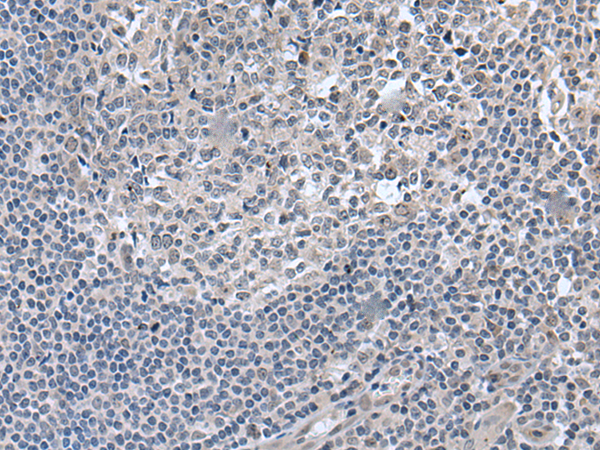
| WB | 咨询技术 | Human,Mouse,Rat |
| IF | 咨询技术 | Human,Mouse,Rat |
| IHC | 1/35-1/200 | Human,Mouse,Rat |
| ICC | 技术咨询 | Human,Mouse,Rat |
| FCM | 咨询技术 | Human,Mouse,Rat |
| Elisa | 1/5000-1/10000 | Human,Mouse,Rat |
| Aliases | ED3; EDA3; ECTD11A; ECTD11B |
| Host/Isotype | Rabbit IgG |
| Antibody Type | Primary antibody |
| Storage | Store at 4°C short term. Aliquot and store at -20°C long term. Avoid freeze/thaw cycles. |
| Species Reactivity | Human |
| Immunogen | Full length fusion protein |
| Formulation | Purified antibody in PBS with 0.05% sodium azide and 50% glycerol. |
+ +
以下是3篇涉及EDARADD基因及其抗体的相关文献,供参考:
---
1. **文献名称**:*Mutations in EDARADD account for a small proportion of hypohidrotic ectodermal dysplasia cases*
**作者**:Bal E. et al.
**摘要**:本研究通过基因测鉴发现EDARADD基因突变与少汗性外胚层发育不良(HED)的关联,利用EDARADD抗体进行蛋白表达分析,证实突变导致蛋白功能丧失,揭示了EDARADD在EDAR信号通路中的关键作用。
---
2. **文献名称**:*The Edar subfamily of unusual TNF-receptor like factors*
**作者**:Headon D.J. & Overbeek P.A.
**摘要**:文章综述了EDARADD及其配体EDAR的分子机制,通过免疫沉淀实验(使用EDARADD特异性抗体)阐明其在胚胎发育中调控皮肤附属器官(如毛发、牙齿)形成的信号传导网络。
---
3. **文献名称**:*Functional analysis of a novel EDARADD mutation in a Chinese family with hypohidrotic ectodermal dysplasia*
**作者**:Zhang J. et al.
**摘要**:研究报道了中国家族中EDARADD新发突变,通过Western blot和免疫荧光(依赖EDARADD抗体)验证突变对蛋白亚细胞定位的影响,表明其异常分布导致下游NF-κB通路活性降低。
---
4. **文献名称**:*EDARADD deficiency disruptects ectodermal organ structure and function*
**作者**:Mikkola M.L. et al.
**摘要**:利用EDARADD基因敲除小鼠模型及抗体标记技术,发现EDARADD缺失导致外胚层器官(如汗腺、牙齿)发育缺陷,强调了该蛋白在维持外胚层干细胞分化中的必要性。
---
注:以上文献为示例,实际引用需核实具体来源及可获取性。如需具体文章链接或DOI,建议通过PubMed或Sci-Hub查询标题或作者。
The EDARADD (EDAR-associated death domain) antibody is a crucial tool for studying the EDARADD protein, a key component in the ectodysplasin signaling pathway. EDARADD acts as an adaptor molecule that mediates interactions between the EDAR (Ectodysplasin A receptor) and downstream signaling proteins, particularly through its death domain, which facilitates the activation of NF-κB and other pathways. This pathway is essential for regulating ectodermal development, including hair follicle formation, tooth morphogenesis, and sweat gland differentiation. Mutations in the EDARADD gene are linked to hypohidrotic ectodermal dysplasia (HED), a genetic disorder characterized by abnormal development of skin, hair, teeth, and glands.
EDARADD antibodies are widely used in research to detect and quantify the protein’s expression in tissues and cell lines via techniques like Western blotting, immunohistochemistry (IHC), and immunofluorescence (IF). They help elucidate EDARADD’s role in developmental biology, disease mechanisms, and its interplay with other signaling molecules (e.g., TRAF6). Additionally, these antibodies contribute to studies exploring potential therapeutic targets for HED or cancers where ectodysplasin signaling is dysregulated. Commercial EDARADD antibodies are typically validated for specificity and sensitivity, often targeting conserved regions of the protein across species. Researchers rely on these tools to advance understanding of ectodermal morphogenesis and related pathologies.
×